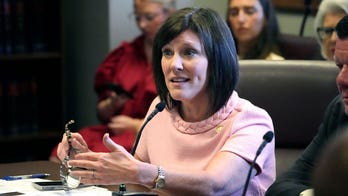The Justice Department has decided not to file criminal charges against the former head of a division at American International Group Inc. whose dealings in mortgage-related securities nearly bankrupted the company and led to a controversial government bailout, according to lawyers involved in the cases.
The decision appears to bring an end to the criminal investigation of AIG, but a Securities and Exchange Commission probe into AIG and the dealings of its London-based Financial Products subsidiary is continuing and could lead to a civil securities fraud case.
Lawyers representing Joseph Cassano, who formerly ran AIG's Financial Products unit, and Andrew Forster, who worked for Cassano, said they were told by federal prosecutors late Friday that no criminal charges would be filed.
A person familiar with the government's criminal investigation of AIG confirmed that charges wouldn't be brought. The person was not authorized to speak publicly on the matter and spoke on condition of anonymity.
The Justice Department declined comment Saturday.
SEC investigators have been involved in the case from the start, but it is unclear when a decision would be made on a civil fraud case.
Federal prosecutors were investigating AIG's Financial Products unit, which dealt in financial contracts called credit default swaps that helped sink AIG in September 2008, leading to a taxpayer-funded bailout. The credit default swaps AIG sold were insurance-like guarantees on mortgage securities that wound up forcing AIG to pay out billions of dollars after the housing market went bust.
Investigators were looking into whether Financial Products officials tried to deceive investors and AIG's auditors, PricewaterhouseCoopers, by misstating the accounting value of a credit default swap portfolio.
When AIG posted a loss for the fourth quarter of 2007, it pinned the blame on an $11 billion writedown related to the credit default swaps held by its Financial Products group.
If AIG couldn't make good on its promise to pay off the contracts, many of which were held by major banks, regulators feared the consequences would pose a threat to the whole U.S. financial system. That led the government to go ahead with the $180 billion bailout.
Cassano's attorneys, F. Joseph Warin and Jim Walden, said in a statement that the two-year federal investigation was intense and difficult.
"The results are wholly appropriate in light of our client's factual innocence," said the statement, which lauded federal agents and prosecutors for following the facts to end the case. "This result was the product of two things: An innocent client and fair prosecutors and agents.
The system worked," the statement said.
Forster's attorneys, David Brodsky and Richard Owens, said in a statement that they knew it would have been easy for federal prosecutors to win a grand jury indictment, but praised them for listening to their client's case.
"We knew the prosecutors were smart, fair and open-minded and that, given a full opportunity to present all the evidence, we could convince them that our client acted at all times in good faith. In the end, the facts were stronger than the emotions surrounding AIG's problems," the statement said.
Cassano left AIG in 2008, shortly after the $11 billion loss was reported. Forster is still employed by the company.
An AIG spokesman did not return a telephone message left Saturday.
The AIG bailout has drawn much public ire, largely because the company paid employees $165 million in retention bonuses after the company nearly failed and had to be bailed out by the government.
Nearly two years after a meltdown in the market for subprime mortgage securities cascaded into the worst financial crisis in the U.S. since the 1930s, prosecutors have had little luck bringing criminal cases against top financial executives. Last November two executives at Bear Stearns who ran hedge funds that collapsed after betting on the subprime mortgage market were acquitted of charges that they lied to investors.




